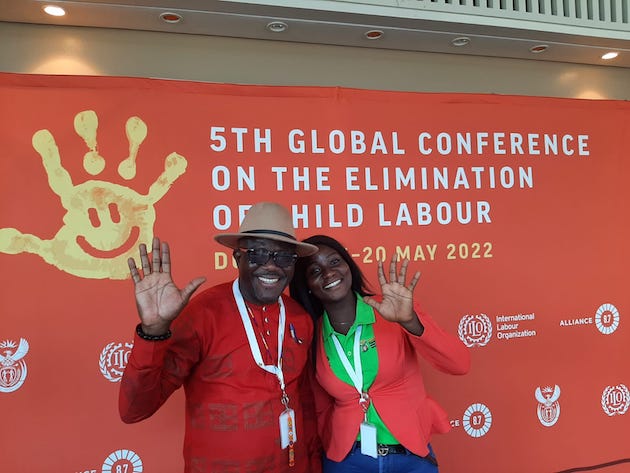[ad_1]

DURBAN, Could 27 (IPS) – Selimatha Dziedzorm Salifu was simply seven years previous when she went to work for the primary time to assist her household.
Born within the fishing village, Kpando-Torkor, in Ghana, Salifu, was compelled to exit and work within the native fishing business when her father Seidu died, leaving her mom, Mary, with six youngsters to feed, dress and shelter. The business is properly documented for youngster slavery and trafficking.
“When my daddy handed, I used to be drawn into youngster labour as a result of mommy didn’t have one thing to handle my siblings. She began travelling to the islands (on lake Volta) in a canoe to purchase fish, and typically I helped her try this, and I helped different fishmongers who have been in the identical enterprise,” Salifu, now 25, informed IPS in an unique interview. “I helped them get the fish prepared for market, reducing and cleansing it, for a payment.” She spoke to us on the sidelines of the 5th World Convention on the Elimination of Youngster Labour in Durban, South Africa.
“I might get up at 4 am and be there. We have been lots of youngsters within the village so I needed to get there early so I may get a buyer. The boys would exit fishing, they didn’t go to high school, and a few have been ill-treated on the lake. They’d get pushed contained in the water to rescue the nets (once they acquired tangled). I discovered that once I would go to high school, I used to be so exhausted, I might sleep in school, and my lecturers would ask me why,” Salifu stated.
Her pay was only one or two Ghanaian cedis which may purchase ‘kenke’ (just like sourdough) and just a little rice. Different youngsters have been typically paid with only one small fish for his or her day’s labour dealing with Tilapia fish, mudfish and electrical fish, Salifu stated.
Regardless of her arduous plight of juggling work and college to outlive, Salifu had a dream: Sooner or later, she can be a instructor and assist youngsters like herself.
“Typically getting meals on the desk was very tough, and buying a college uniform was very tough. I nearly dropped out of faculty, however the God I serve saved me. I had a imaginative and prescient to need to be a childcare practitioner, to have my very own establishment to assist youngsters on the road identical to myself,” Salifu stated. “After which someday, I occurred to fulfill this man on the river shore by my village, on the financial institution, going about my each day routine. I narrated my story to him, and he stated he was going to speak to his group and they’d assist me.”
That man was Andrews Tagoe, deputy normal secretary of the Common Agricultural Staff’ Union of TUC. He’s additionally a regional coordinator for Africa of the World March In opposition to Youngster Labour.
Tagoe had been working within the village, advocating in opposition to youngster labour, talking to folks and educating them concerning the significance of sending their youngsters to high school relatively than to work.
“I met the mother and father within the village and the fishermen and was speaking about respectable work and the fishing course of and regular union points,” Tagoe stated.
He stated most mother and father needed their youngsters to turn into attorneys and medical doctors, but they have been out on the seaside working throughout college hours.
“So, I acquired up and went and seemed on the seaside throughout college time at round 10 am and located the seaside full of youngsters concerned in actions, carrying fish, and I seemed to the left, and there have been school rooms and lecturers with out youngsters,” Tagoe stated.
Tagoe then made it his mission to achieve out to the working youngsters, like Salifu and commenced assembly with them and chatting about their lives, hopes and desires.
“The mother and father additionally stated that we didn’t know the unions work with youngster labour. So, let’s see what we are able to do to begin a toddler labour free zone. There was an infinite discount in youngster labour, and extra youngsters are actually going to high school,” he stated.
“Since 2000 thus far, the union has helped greater than 4500 youngsters in the entire of the agricultural sector, from rice, cocoa and palm oil to lake fishing,” Tagoe stated.
A report by NORC on the College of Chicago has claimed that there are nearly 1,6 million youngsters concerned in youngster labour within the cocoa business alone in Ghana and the Ivory Coast.
NORC carried out surveys with youngsters aged between 15 and 17 between 2008 and 2019, displaying cocoa manufacturing rose by 62%.
Nonetheless, the report acknowledged that the governments of Côte d’Ivoire and Ghana had carried out training reforms, comparable to free training and obligatory attendance to battle youngster labour. This led to youngsters’s college attendance from agricultural households rising from 58 to 80 p.c in Côte d’Ivoire and 89 to 96 p.c in Ghana.
Salifu stated Tagoe’s group – she fondly refers to him as “daddy’ – assisted her in remaining at school to observe her dream.
“I assumed my prayers had been answered. They got here to take accountability for my college (work), buying my textbooks, and I used to be capable of write fundamental training exams,” Salifu stated.
She went to high school within the mornings and continued working afternoons to assist her household.
Salifu accomplished her Fundamental Schooling Certificates after which labored for six months shopping for fish and promoting it in close by cities to boost cash for Senior Excessive College.
“Once more, GAWU supported me by paying for a few of my charges. I completed senior excessive on the age of 19 in 2016. I’ve at all times dreamed of being the best instructor on this planet and proudly owning my very own establishment, and dealing with youngsters,” Salifu stated.
Her dream was partially realised when she acquired a job working at an area college earlier than shifting to Accra, the place she studied at a Montessori instructor’s coaching establishment. She obtained her Nationwide Diploma in Montessori Coaching and took up a place at Tender Sprout Worldwide College in Accra.
“The place I’m working, the youngsters come from good properties and are even dropped off at college. However I need to return to my neighborhood and assist my brothers and sisters within the village and close by communities and islands to assist liberate them from youngster labour,” Salifu stated.
“I nonetheless need to construct on my dream to assist the orphans and get the youngsters again dwelling. My mother could be very aged now too, so I have to assist my different siblings and my mom at dwelling. There isn’t a cash at dwelling, so they give the impression of being as much as me. I want to return to school to get a level in early childhood training.”
“God has saved me now as a result of some mates my age ended up dropping out, and a few had teenage pregnancies and STDs. I’m very, very fortunate,” Salifu stated.
Salifu hopes telling her story shall be a voice to assist these nonetheless trapped in youngster labour escape.
“I believe our voices must be heard right here so we are able to return and launch a undertaking with our brothers and sisters so we may also help them. That’s my motive for being right here. The dream have to be achieved,” Salifu stated.
IPS UN Bureau Report
That is certainly one of a collection of tales IPS printed concerning the fifth World Convention on the Elimination of Youngster Labour in Durban, South Africa.
Comply with @IPSNewsUNBureau
Comply with IPS Information UN Bureau on Instagram
© Inter Press Service (2022) — All Rights ReservedAuthentic supply: Inter Press Service
[ad_2]
Source_link


